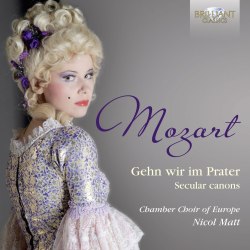|

|
Wolfgang Amadeus MOZART (1756-1791)
Gehn wir im Prater - Secular Canons
see end of review for track listing
Chamber Choir of Europe/Nicol Matt
Klarinetten-Trio der Musikschule Achern-Oberkirch (tracks 4, 7, 9, 14, 17, 20, 25, 28, 34,); soloists of the Württembergischen Philharmonic Reutlingen (tracks 1, 38)
rec. November 2002, Alte Kirche Fautenbach, Germany. DDD
BRILLIANT CLASSICS 94783 [68:08]
Nicol Matt is the director of the Chamber Choir of Europe (formerly the Nordic Chamber Choir). I knew of him principally from his excellent recording of the oratorio arrangement of Haydn’s “Seven Last Words” made in the same year as this Mozart “Secular Canons”, performed here with zeal, energy and musicality. The Brilliant label has issued many bargain sets of their recordings of choral music by Bach, Mozart, Mendelssohn and Bruckner but this one is perhaps a little off the beaten track. It is a collection of thirty of what are popularly known as “rounds” for a small chorus of fourteen voices, interspersed with ten instrumental canons for three clarinets or strings. It’s introduced by a delightful, sombre, stately little Adagio for two clarinets and bassoon. This was probably integrated into some Masonic ritual.
So, we have 41 canons in just under seventy minutes: “do the math”; they are mostly no more than a minute or two each with only the “Kyrie” being substantially longer at nearly six minutes and by far the most “serious” and substantial vocal composition here. The listener will probably not want to digest them all at one sitting; they are good for dipping into and enjoying as cleverly crafted curiosities. However, there is a misconception that Mozart wrote them purely for pleasure. While they are clearly full of fun, including the kind of humour which the more po-faced will find puerile and others merely indicative of Mozart’s human, knockabout side, there is plenty of evidence that he considered the writing of counterpoint as central and fundamental to a composer’s craft and used them as essential practice and teaching exercises.
Everyone with a musical bent likes canons and some of us will remember the first time as a child we heard or sang the old round “London’s Burning”. Most of us like a joke, too and Mozart frequently combines the two here, indulging in his infamous taste for scatological and sexual humour. Here, I must cite the celebrated pairing of “Leck mir den Arsch” and “Leck mich im Arsch”, whose amusing coarseness is merely underlined by their being enunciated so precisely and intoned so angelically. As the German ambassador once solemnly observed in a BBC Radio 3 news interview without a hint of irony, “We Germans take our sense of humour very seriously”; the Austrian Mozart, too, knew that his supposed anal fixations could be used simultaneously both to entertain and instruct his Viennese acquaintance.
The tone and topics of these miniatures cover a wide range: the quasi-operatic, madrigal or “stile antico”, drinking songs, word games and multi-lingual puzzles, declarations of love, jocular insults, literary references (such as to Goethe, who scandalised polite society with his use of the “arse” vulgarity in his play “Götz von Berlichingen”) liturgical (even though their purpose was for secular, home use) and even ironic reference to the composer himself: “Hier wird Mozart literarisch!”. Brilliant Classics usefully supply texts but not, unfortunately, translations, although the notes explain the main linguistic jokes. You don’t need a lot of German or Italian to decipher the last bit of “Difficile lectu mihi mars et jonicu” as “Lech du mich im Arsch” or to hear “jonicu” as “cujoni” when it is rapidly repeated, thereby creating the Italian taboo word for “testicles”. High art, this is not - but it’s good fun and beautifully performed.
Ralph Moore
Track listing
1 Adagio, K. 410 [1:06]
2 Leck mir den Arsch, K. 233 [1:46]
3 Lieber Freistädtler, K.232 [2:17]
4 Canon, K. 508a No. 1 [1:02]
5 O du eselhafter Martin, K. 560b [2:46]
6 Bona nox, K. 561 [1:15]
7 Canon, K. 508a No. 2 [0:53]
8 Leck mich im Arsch, K. 231 [1:58]
9 Canon, K. 508a No. 3 [1:07]
10 Kyrie, K. 89 [5:40]
11 Alleluja, K. 553 [1:24]
12 Ave Maria, K. 554 [1:51]
13 Dona nobis pacem, K. 109 [1:11]
14 Canon, K. 508a No. 4 [1:19]
15 Heiterkeit und leichtes Blut, K. 507 [1:14]
16 Hei wenn die Gläser, K. 89a [0:50]
17 Canon, K. 508a No. 5 [1:16]
18 Essen, trinken, K. 234 [1:25]
19 Auf das Wohl aller Freunde, K. 508 [0:57]
20 Canon, K. 508a No. 6 [1:01]
21 Incipe, K. 89a II [1:56]
22 Cantate Domino, K. 89a II [1:51]
23 Confitebor tibi, K. 89a II [1:48]
24 Tebana bella, K. 89a II [1:06]
25 Canon, K. 508a No. 7 [1:25]
26 G'rechtelt's enk, K. 556 [1:15]
27 Gehn wir im Prater, K. 558 [1:59]
28 Canon, K. 508a No. 8 [1:23]
29 V'amo di core, K. 348 [1:48]
30 Lacrimosa, K. 555 [1:53]
31 Caro bell'idol mio, K. 562 [1:54]
32 Nascoso è il mio sol, K. 557 [2:36]
33 Difficile lectu, K. 559 [1:21]
34 Canon, K. 508b [2:15]
35 Seht, Sie ist dahin, K. 229 [2:17]
36 Selig, selig alle, K. 230 [2:09]
37 Heil dem Tag, K. 347 [1:44]
38 Canon for 2 Violins, Viola and Bass, K. 191 [1:10]
39 Horch, ihr süßes Lied, K. 562a [1:05]
40 Lebet wohl, K. 228 [1:03]
41 Sinkt die Nacht, K. Anh. 109d [1:26]
 |
 |
|



 All Nimbus reviews
All Nimbus reviews








